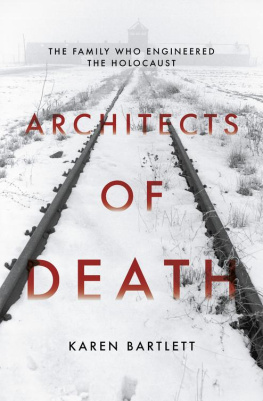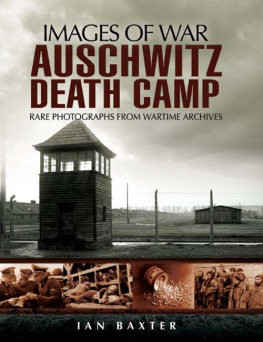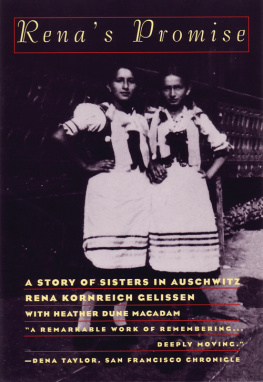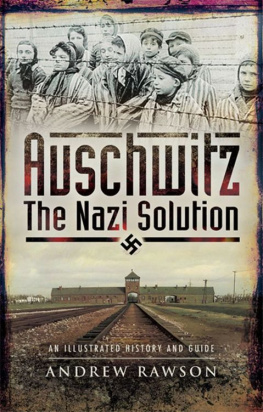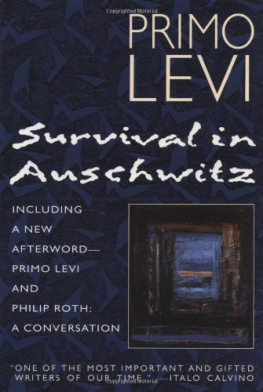INSIDE THE GAS CHAMBERS
First published in French as SonderkommandoDans lenfer des chambres gaz ditions Albin Michel S.A.-Paris, 2007
This English edition Polity Press, 2009
Polity Press
65 Bridge Street
Cambridge CB2 1UR, UK
Polity Press
350 Main Street
Malden, MA 02148, USA
All rights reserved. Except for the quotation of short passages for the purpose of criticism and review, no part of this publication may be reproduced, stored in a retrieval system, or transmitted, in any form or by any means, electronic, mechanical, photocopying, recording or otherwise, without the prior permission of the publisher.
ISBN: 978-0-7456-8376-8
A catalogue record for this book is available from the British Library.
The assertions, arguments and conclusions contained herein are those of the author or other contributors. They do not necessarily reflect the opinions of the United States Holocaust Memorial Museum.
Every effort has been made to trace all copyright holders, but if any have been inadvertently overlooked the publishers will be pleased to include any necessary credits in any subsequent reprint or edition.
For further information on Polity, visit our website: www.polity.co.uk
I dedicate this book to my two families: my family from before the war, and my family from after it. My first thoughts go to my dearest mother only forty-four years old at the time of these events and my two young sisters, Marica and Marta, then fourteen and eleven, respectively. I often think sadly of the difficult life my mother had, being widowed very young with five children. Making many sacrifices, and struggling against almost insuperable difficulties, she brought us up in accordance with wholesome principles, such as being honest and respecting people. These sacrifices and these sufferings all counted for nothing, as they were wiped out at the same time as were my young sisters, no sooner than they had climbed out of the cattle cars onto the Judenrampe of Auschwitz-Birkenau on April 11, 1944.
My other family came into being after the great tragedy. My wife Marika and my three sons, Mario, Alessandro, and Alberto, know many things better than I do and base their lives on the essential principles of honesty and respect for others. My wifes tenacity has meant that they have managed to grow up into men I can be proud of. Marika has also taken great care of me, and lightened the burden of the infirmities that ensued from my imprisonment in the camps. She deserves more than my silent affection. Thank you, Marika, for all you have done up until now and all that you continue to do with our six grandchildren: Alessandra, Daniel, Michela, Gabriel, Nicole, and Rachel, and our daughters-in-law, Miriam, Angela, and Sabrina.
Your husband, father, and grandfather,
Shlomo Venezia
The whole truth is much more tragic and terrible.
Zalmen Lewental
Zalmen Lewentals manuscript in Yiddish was discovered in October 1962, buried in the yard of the Auschwitz Crematorium. It was written shortly before the outbreak of the Sonderkommando revolt, so as to leave an eye-witness account and some trace of the extermination of the Jews in the gas chambers. Lewental seems to have died in November 1944, only a few weeks before the Liberation. Taken from Des voix sous la cendre: Manuscrits des Sonderkommandos dAuschwitz-Birkenau, ed. by Georges Bensoussan, Revue dhistoire de la Shoah, no. 171 (January April 2001).
CONTENTS
FOREWORD
by Simone Veil
Shlomo Venezia arrived in Auschwitz-Birkenau on April 11, 1944; I arrived there myself, from Drancy, four days later. Until September 9, 1943, we had lived he in Greece, I in Nice under Italian occupation, with the feeling of being, at least provisionally, safe from deportation. But, after the capitulation of Italy, the Nazi vise immediately tightened, both on those who lived in the Alpes-Maritimes and on those in the Greek archipelago.
When I speak of the Shoah, I often refer to the deportation and extermination of the Jews of Greece, since what happened in that country illustrates perfectly the fierce tenacity with which the Nazis pursued the Final Solution, hunting down the Jews even in the smallest and most remote islands of the archipelago. So it was with particular interest that I read the story of Shlomo Venezia, a Jew, an Italian citizen, who speaks not only Greek but also Ladino, the dialect of the Jews of Salonika where he lived. His name, Venezia, refers to the time when his ancestors, in the years of wandering that followed the expulsion of the Jews from Spain in 1492, had traveled to Italy before moving on to Salonika, the Jerusalem of the Balkans, ninety percent of whose Jewish community was exterminated during the Second World War.
I have read many accounts written by former deportees, and each time they take me back to life in the camp. But the story told by Shlomo Venezia is especially overwhelming because it is the only complete eye-witness account that we have from a survivor of the Sonderkommandos. Now we know precisely how they were condemned to perform their abominable task, the worst task of all: that of helping the deportees who had been selected for death to get undressed and to enter the gas chambers, then of taking away all those corpses, bodies intertwined with each other in their death struggles, to the crematorium ovens. As they were unwilling accomplices of the executioners, almost all of the members of the Sonderkommando were murdered, just like those they had led to the gas chambers.
The force of this eye-witness account comes from the irreproachable honesty of its author. He relates only what he himself saw, leaving nothing out: neither the worst, such as the barbarity of the man in charge of the Crematorium, nor the summary executions or the uninterrupted functioning of the gas chambers and the crematorium ovens; he also speaks of what might attenuate the horror of the situation, such as the relative mercy shown by a Dutch SS officer, or the less atrocious conditions of survival that the members of the Sonderkommando received relative to those of the other deportees, since the Sonderkommandos were the indispensable servants of the machinery of death. Another thing that makes his account exceptional is that only when he engaged in this dialogue with Batrice Prasquier did Shlomo Venezia dare to mention the most macabre aspects of his work in the Sonderkommando, adding details of unbearable horror that bring out the full extent of this abominable Nazi crime.
With his simple words, Shlomo Venezia gives new life to the emaciated faces, with their exhausted, resigned, and often terror-stricken eyes, of those men, women, and children whom he is seeing for the last time. There are those who are unaware of the fate that awaits them; those who, coming from the ghettos, fear that there is little hope of surviving; and finally those who, being selected in the camp, know that death awaits them but then, for many of the latter, death comes as a deliverance.
A glimmer of humanity sometimes lightens the horror in which Shlomo Venezia tries to survive in spite of everything. There is his meeting, at the threshold of the gas chamber, with his uncle Lon Venezia, who is now too weak to work, and Shlomos attempt to give him a final bite to eat. The younger man can lavish one last gesture of tenderness on the older and then recite a



